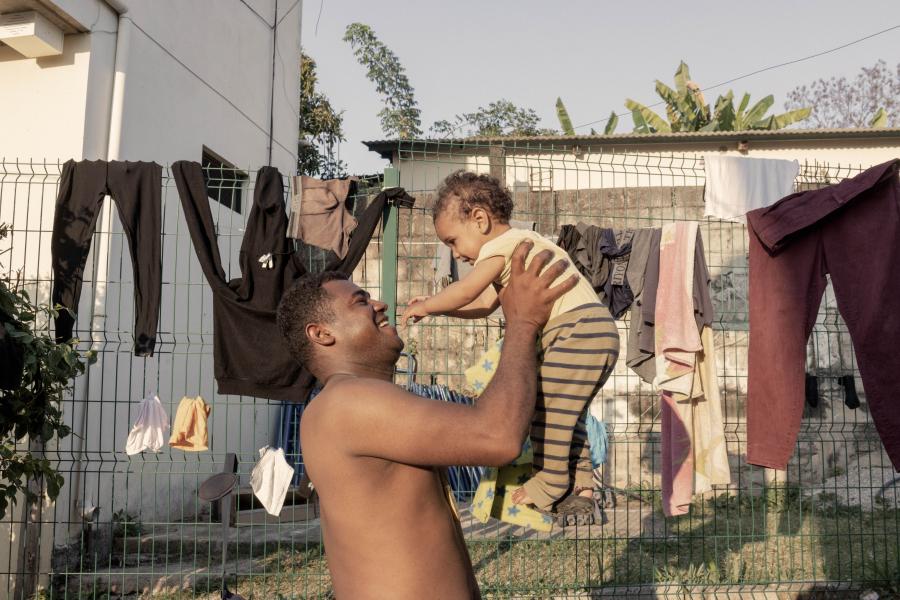2022 Year-end population figures
-
Refugees: 100,500
-
Asylum-seekers: 127,300
-
IDPs: 6.8 million
-
Other populations of concern in Colombia: 516,000
*Figures for refugees and asylum-seekers refer to forcibly displaced Colombians in Argentina, Belize, Bolivia, Canada, Chile, Ecuador, Guyana, Panama, Paraguay, Spain, Trinidad and Tobago, the United States of America, Uruguay and the Bolivarian Republic of Venezuela.
2022 situation overview
In 2022, the new Colombian Government proposed a proactive legislative agenda with three priorities intended to change the trajectory of the country and move towards sustainable development: total peace, social justice and environmental justice, aimed at the implementation of the National Development Plan 2022-2026. The total peace priority included the establishment of formal dialogues with over 30 irregular armed groups and entities to achieve sharp reductions in the level of violence.
Total peace led to some important advances in 2022, including a decrease in clashes between the Colombian army and some irregular armed actors. However, implementation will be a complex, extended process. In the second half of 2022, confrontations among irregular armed actors increased along the Pacific coast and in the eastern regions of the country. This led to forced displacement across borders, with around 500 new Colombian asylum-seekers registered in Ecuador.
Increasing internal displacement and confinement represented a major challenge, particularly associated with illicit economies and dynamics linked to armed violence, drug trafficking, recruitment and use of antipersonnel mines and unexploded ordnance, and risks faced by community leaders and authorities. In 2022, according to official figures, there were 176 major displacement events, affecting 68,000 people, representing a 10% increase from 2021. Similarly, 76 confinements occurred affecting 69,000 people, a 16% increase from 2021. The Government’s Victims’ Unit registered a total of 215,000 forcibly displaced people, the highest number since the signature of the Peace Agreement in 2016. Afro-Colombians and indigenous people continued to be the most affected by the armed conflict.
UNHCR continued to support the State to improve its institutional response to internal displacement by strengthening the Government’s capacity at the national and local levels to prevent displacement, provide protection, and support durable solutions. UNHCR also supported the State’s presence and response in the areas most affected by the conflict through key institutions (e.g., local Ombudspersons’ Offices), strengthening alternative ways of registering offline declarations of victims of the armed conflict, as well as declarations of people who had been victims of mass displacement events or confinement. Throughout 2022, UNHCR directly assisted 187,600 Colombians, the majority of whom were IDPs or host communities to refugees and returnees. UNHCR also provided direct protection services to over 26,000 Colombians who required access to information about rights and services, including humanitarian assistance.
Similarly, UNHCR, jointly with Government institutions, ethnic authorities, humanitarian, and civil society actors, contributed to strengthening community structures, both at national and local levels, to improve internally displaced people’s self-protection mechanisms, and expand spaces for their effective participation in local planning and decision-making. At the national level, UNHCR promoted the inclusion of affected communities in the design and formulation of public policies and for them to be able to influence the State’s protection mechanisms.
In 2022 alone, over 39,000 people benefited from UNHCR’s long-standing experience in addressing solutions to internal displacement in Colombia, including technical assistance to key institutions, strong engagement with affected communities, and support for the legalization of 41 informal settlements, which hosted internally displaced people as well as refugees and migrants. UNHCR also assumed the role of co-leader, jointly with UNDP, of the new UN Steering Group on Solutions to Internal Displacement. The group harnessed the UN’s efforts and provided support to the Government through a “triple nexus” approach (humanitarian/development/peace) and advanced the implementation of recommendations of the High-Level Panel on Internal Displacement.
By the end of 2022, there were 61,100 Colombian refugees and asylum-seekers among the 565,200 forcibly displaced people in Ecuador. UNHCR worked with the Ecuadorian Government to strengthen the quality of its asylum system and alternative protection-oriented legal stay arrangements. Likewise, according to official Government data, the Bolivarian Republic of Venezuela hosted over 9,400 recognized refugees, 20,000 people in a refugee-like situation, and 1,000 asylum-seekers. UNHCR strengthened its institutional relations with the National Commission for Refugees (CONARE) and the Office of the Ombudsperson by signing a Tripartite Agreement. UNHCR also supported CONARE’s outreach registration and documentation brigades, where CONARE registered 550 new asylum-seekers and recognized 19 refugees.
